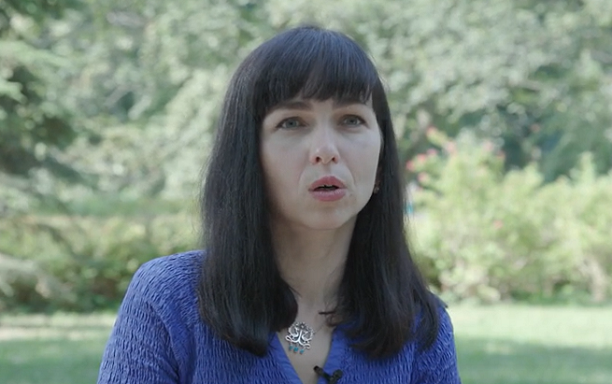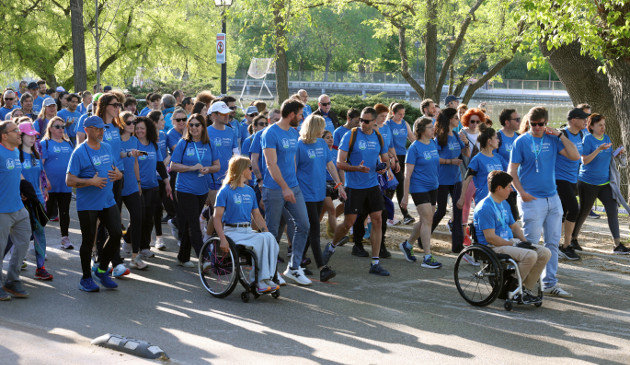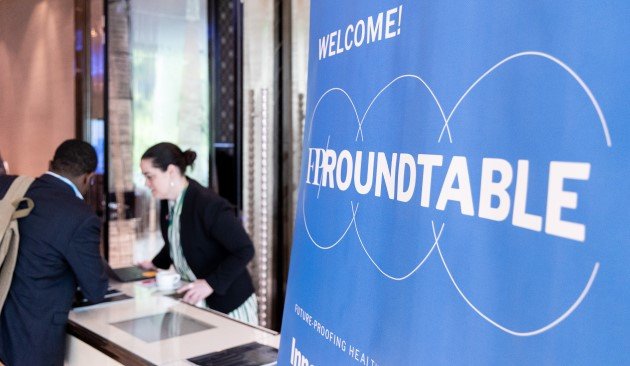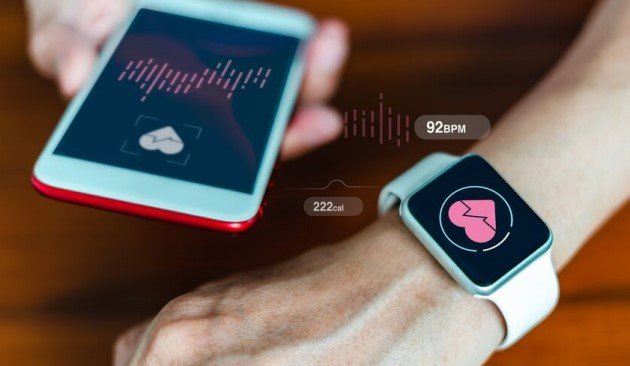Natalia Shadorsk, 38, was forced to leave Kyiv in Ukraine to protect her six-year-old twin daughters. Natalia and the girls have settled in Warsaw, but she lives in fear for her as husband of 12 years remains fighting on the frontline. Natalia has always loved her career as a doctor, and was thrilled to be accepted onto LUX MED’s programme to help Ukrainian doctors gain the language skills and paperwork required to practice in Poland.
“Everyone at LUX MED has been so helpful and inspirational. I’ve had Polish lessons every day from 8am to 3pm and now I’m starting to work as a doctor’s assistant, helping Polish doctors translate when they have patients from Ukraine. I have a lot of stuff to learn because the Polish medical system is different from the Ukrainian one. But this is such a fantastic opportunity.
I worry constantly about my husband on the front line; I’m always waiting for a call or message. Sometimes I wait for three days or more and I hear nothing and that sends me crazy. But when he calls me, I’m so relieved and happy.

Peacetime in Kyiv
We had a good life in Ukraine. We’d see our friends and go swimming, kayaking and stand-up paddleboarding in the river with the children. My husband loves climbing mountains and even though I’d complain about the climbing and insist we take breaks all the time, I loved spending time with him in nature in the beautiful Carpathian Mountains.
My daughters really miss their dad. He used to spend a lot of time with them, taking them on bike rides or playing sport with them when I had to work at the weekends or evenings. I was working as a paediatric cardiologist in a very good clinic in Kyiv with a great team of friends.
Woken by an explosion
We were sound asleep when we were woken at 6am by a big explosion. We turned on the television and that’s when we realised Russia was bombing us. We were in shock. We began packing our bags, because we didn’t know what to do – to stay in the city or leave. I was very nervous because of my children, and I also knew that my husband would have to leave us. He’s a trained soldier and it was impossible for him not to join up. That evening we drove to my mother’s home outside Kyiv in Western Ukraine.
“We were sound asleep when we were woken at 6am by a big explosion. We turned on the television and that’s when we realised Russia was bombing us.”
That was a terrible journey. It’s not far, but the roads were jammed and there were a lot of people who were horribly hurt. When we arrived at my mum’s home, my husband slept for two hours then left us. I didn’t know if I would ever see him again, and for him it was hard too because he was leaving his family.
Hospitals bombed
I have a childhood friend who decided not to escape, to stay and help people as an emergency doctor. The building next to the makeshift hospital where she was working was bombed and she and her colleagues were trapped inside for over a month. Every morning I sent messages to my husband and my friend in Kyiv.
It was a very difficult decision to finally leave Ukraine because I had this idea I could go to my husband if he was hurt. But the bombing got worse, and my cousins who had arrived in Poland were pleading with us to join them and then my husband called me to say it was too dangerous to stay.
We travelled to Poland by bus. We were at the border for six hours and my children were exhausted and anxious. It was very stressful, feeling so alone without my husband with two small children to reassure, going to another country with no idea of what to expect or when we can return.
The Polish people have been so kind and helpful. We arrived on Sunday and on Monday my children were able to start in the kindergarten. There were nine of us living in a two-bedroom apartment – three cousins, each of us with two children. My children and I slept in the kitchen. But we kept each other’s spirits up and being so cooped up was a distraction from thinking about the war and the people we’d left.
A fresh start in Warsaw
I went with two friends, all doctors, to look for work. We’d been told that LUX MED has a very good reputation. We went to the first medical centre we found on a map where the director advised us – talking to each other in broken English – to go to another centre where they work with Ukrainian patients. At that centre we gave our phone numbers and two weeks later I received a call asking me to come for an interview for a specific programme for Ukrainian doctors.
When I heard I’d received a place, I was delighted. It’s horrible feeling that you are a refugee, and now I’m closer to working as a doctor, being more of the person I was in Ukraine. We all need to feel needed. I’m so appreciative of the help I’ve received from LUX MED. I’m a very optimistic person and I have big hopes for the future. I will be strong, and back home we will win this war.”
Since Russia’s invasion of Ukraine in February, our business in Poland, LUX MED, has been supporting refugees who have been forced to flee the war. We made our position clear about not doing business with Russia as a result of the military action, and we are making a meaningful, long-term contribution to help Ukrainian refugees in Poland. To date, we have provided 240,000 free treatments to over 130,000 Ukrainian people and have employed 193 healthcare workers from Ukraine. We will continue to fund this support for as long as needed.



